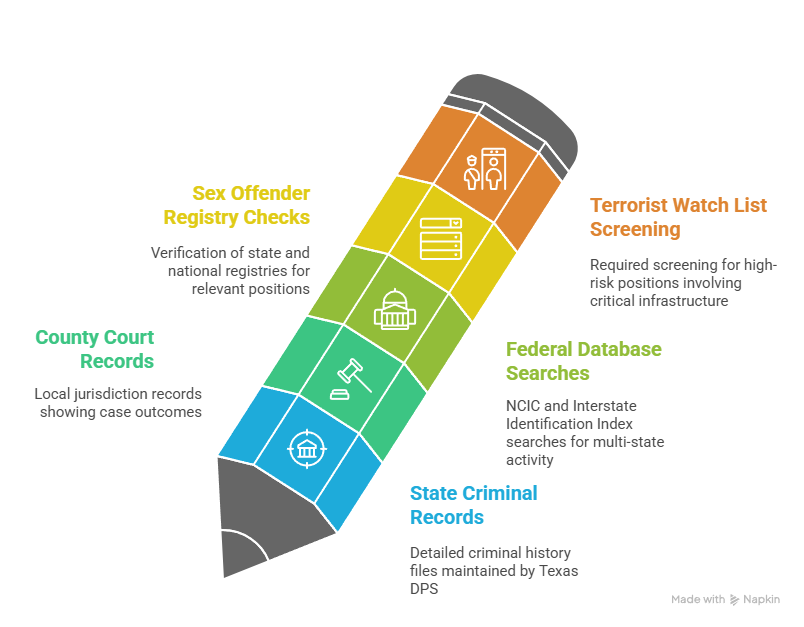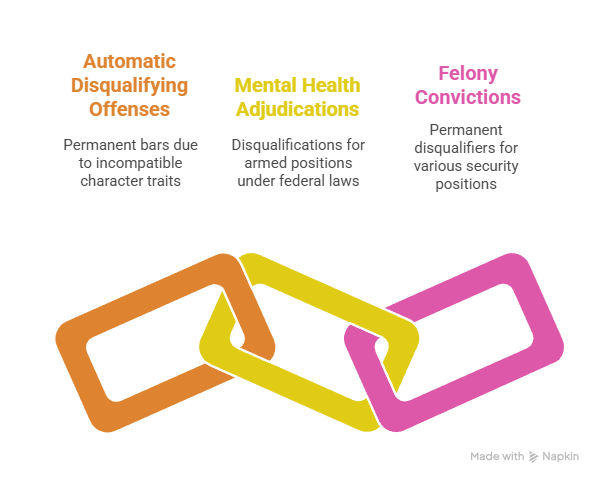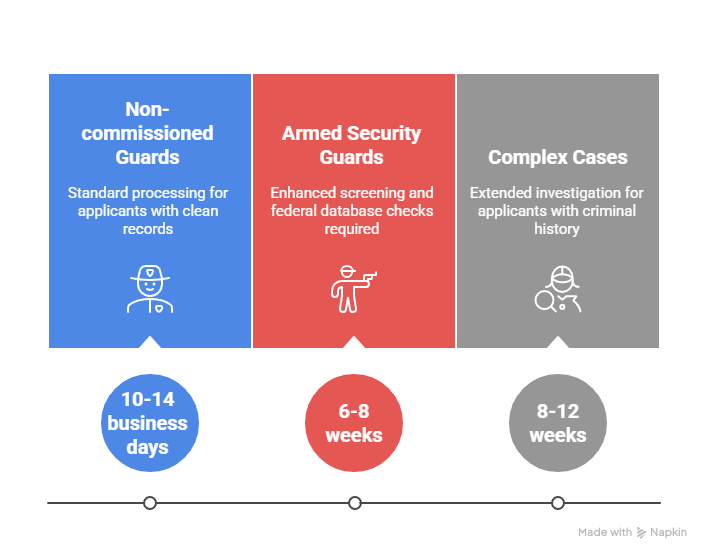Texas security guard background checks involve comprehensive criminal history verification through both state and federal databases, with specific requirements varying between unarmed and armed security positions. Employers must navigate TCOLE regulations, FBI fingerprinting requirements, and disqualifying factors that can permanently bar candidates from security work.
Key Takeaways
- Texas security guards undergo background checks through the Texas Commission on Law Enforcement (TCOLE) and FBI databases
- Armed security guards face stricter requirements including Level II background checks and additional training certifications
- Felony convictions, certain misdemeanors, and mental health adjudications typically disqualify candidates from security positions
- Background check processing times range from 2-8 weeks depending on the license type and complexity of the applicant's history
- Employers must comply with FCRA regulations and provide proper disclosure when conducting pre-employment screening
- Cost considerations include state fees ($25-$200), fingerprinting ($50-$75), and training requirements ($150-$500)
Understanding Texas Security Guard License Classifications
Texas operates a tiered security licensing system that determines the depth of background check requirements. The Texas Private Security Board oversees non-commissioned security officers. Meanwhile, TCOLE manages commissioned (armed) security personnel. Each classification carries distinct screening protocols and disqualifying factors that employers must understand clearly. These different pathways create varying compliance requirements and processing timelines for security companies.
Non-commissioned security officers handle basic security duties without firearms throughout Texas facilities. These positions require a standard criminal background check through the Texas Department of Public Safety databases. Additionally, they may include county-level record searches depending on employer requirements and client specifications. The screening process focuses on criminal history within the past seven years primarily. Particular attention goes to theft, assault, and drug-related offenses that impact trustworthiness. Most employers prefer this route due to faster processing times and lower costs for high-volume hiring needs.
Commissioned security officers carry firearms and undergo enhanced background screening through TCOLE oversight. TCOLE requires FBI fingerprint checks, psychological evaluations, and comprehensive criminal history reviews for all armed positions. These reviews extend beyond the standard seven-year lookback period significantly for thorough evaluation. These positions demand the highest level of scrutiny due to the inherent responsibilities of armed security work. Furthermore, federal regulations add another layer of complexity to the process through Gun Control Act requirements. Consequently, many candidates find the armed security path more challenging to navigate successfully due to stricter standards.
Required Background Check Components for Texas Security Guards
Texas security guard background checks examine multiple databases to ensure comprehensive screening across jurisdictional boundaries. State repositories include Texas Department of Public Safety records, county courthouse filings, and municipal violation databases for complete coverage. Federal searches access FBI National Crime Information Center (NCIC) records and nationwide criminal databases for interstate verification. Interstate databases reveal criminal activity that might not appear in state-only searches through data sharing agreements.

- State Criminal Records: Texas DPS maintains centralized criminal history files dating back decades with detailed arrest and conviction information
- County Court Records: Local jurisdictions provide detailed case information and disposition records showing final outcomes of criminal charges
- Federal Database Searches: NCIC and Interstate Identification Index searches reveal multi-state criminal activity and federal violations
- Sex Offender Registry Checks: Both state and national registry verification for applicable positions requiring public interaction
- Terrorist Watch List Screening: Required for all armed security positions and high-risk assignments involving critical infrastructure
The verification process includes several critical components that employers must understand to make informed hiring decisions effectively. Processing times vary significantly based on the scope of required searches and complexity of applicant history.
Criminal History Verification Process
The criminal history verification process involves thorough examination of multiple record sources throughout Texas and beyond. State-level searches provide the foundation for most security guard screenings with comprehensive coverage. However, federal database access becomes necessary for armed positions and high-risk assignments requiring enhanced clearance. Standard non-commissioned checks typically complete within 10-14 business days when applicants have clean records and straightforward histories.
Complex criminal histories or multi-state residence patterns can extend processing significantly beyond standard timeframes. TCOLE investigators may contact law enforcement agencies directly for clarification on arrest records and case dispositions. This additional verification ensures accuracy but adds processing time to the overall screening timeline. Moreover, holidays and peak application periods can create additional delays that employers should anticipate and plan for accordingly.
Fingerprinting and Identification Requirements
All Texas security guards must complete LiveScan fingerprinting through approved vendors statewide for accurate identification verification. The Texas Department of Public Safety maintains a network of certified fingerprint collection sites throughout the state for convenience. Applicants present valid photo identification and complete digital fingerprint capture for both state and federal background checks simultaneously. The digital process ensures high-quality prints and faster processing compared to traditional ink methods.
| Service Component | Cost Range | Processing Time |
| LiveScan Fingerprinting | $50-$75 | Same day |
| State Background Check | $15-$25 | 5-7 days |
This process ensures accurate identification and prevents identity fraud during the screening process effectively. Results route directly to the licensing authority, eliminating applicant handling of sensitive criminal history information and maintaining security protocols.
Disqualifying Factors and Criminal History Restrictions
Texas security guard disqualifications fall into several categories that can permanently or temporarily bar employment opportunities. Understanding these restrictions helps employers screen candidates effectively and avoid costly hiring mistakes that impact operations. The severity and timing of offenses significantly impact eligibility determinations according to state guidelines. Moreover, federal regulations may impose additional restrictions beyond state requirements for armed positions. These overlapping jurisdictions create complex eligibility matrices that require careful evaluation by employers and licensing authorities.

Automatic disqualifying offenses create permanent bars to security guard employment in Texas without exception provisions. These offenses demonstrate character traits incompatible with security responsibilities and public trust requirements. They cannot be overcome through waiting periods or rehabilitation evidence regardless of circumstances. Additionally, mental health adjudications create automatic disqualifications for armed security positions under federal firearms laws. Court-ordered mental health treatments and competency determinations also fall under these restrictions for public safety considerations.
Felony convictions represent the most common permanent disqualifiers for Texas security guard positions across all classifications. Murder, aggravated assault, and robbery convictions demonstrate violent tendencies incompatible with security work and public safety. Sexual assault and crimes involving children create public safety concerns that licensing authorities cannot overlook under any circumstances. Theft-related felonies, including burglary and embezzlement, violate the trust essential to security responsibilities and client confidence. Drug trafficking convictions indicate poor judgment and potential for corruption that disqualify candidates permanently from all security positions.
Time-Limited Disqualifying Factors and Rehabilitation Considerations
Some criminal convictions create temporary barriers that may be overcome after specified waiting periods with evidence of rehabilitation. These provisions recognize rehabilitation potential while maintaining public safety standards throughout the evaluation process. Employers should verify current eligibility status for applicants with qualifying criminal histories before proceeding with hiring. Class A misdemeanor convictions typically require five-year waiting periods from completion of sentence, including probation and parole terms completely. This waiting period allows for demonstration of positive behavior change and community reintegration efforts.
Class B misdemeanors may disqualify candidates for two years following sentence completion according to state regulations. Drug possession charges often fall into these categories, requiring case-by-case evaluation of circumstances and rehabilitation efforts demonstrated. Additionally, employers must consider the nature of the offense in relation to security duties and responsibilities. For instance, theft-related misdemeanors receive greater scrutiny than traffic violations due to trustworthiness concerns. However, multiple minor offenses can establish patterns that concern licensing authorities and create cumulative disqualification risks for applicants.
Texas licensing authorities also consider evidence of rehabilitation when evaluating applications with criminal history backgrounds. Letters of recommendation from employers, community leaders, and rehabilitation program participants can strengthen applications significantly with concrete examples. Furthermore, stable employment history and community involvement demonstrate positive character development over time since conviction. Nonetheless, the burden of proof rests with the applicant to demonstrate suitability for security work through concrete evidence. Documentation of rehabilitation efforts becomes crucial for borderline cases requiring individual assessment by licensing officials and review boards.
TCOLE Armed Security License Background Check Requirements
Enhanced Screening Protocols for Armed Positions
TCOLE investigators review court records, police reports, and witness statements to determine character suitability for armed security work comprehensively. Applicants must demonstrate good moral character and sound judgment essential for armed security responsibilities and public safety. The investigation extends beyond criminal convictions to examine arrest records and police contacts that may indicate patterns of behavior. Even dismissed charges may raise questions about an applicant's suitability for armed security work requiring firearms access and authority.
Federal disqualifiers under the Gun Control Act also apply to Texas armed security positions automatically without state override options. These include felony convictions, domestic violence misdemeanors, and restraining order violations that prohibit firearms possession under federal law. The intersection of state and federal regulations creates complex eligibility requirements that demand careful evaluation by employers and licensing authorities. Immigration status and citizenship requirements add additional layers of complexity to the federal eligibility determination process.
Training and Certification Requirements
Training requirements compound the background check process for armed security licenses significantly beyond basic screening procedures. Candidates must complete 40 hours of classroom instruction and demonstrate firearms proficiency before license approval and employment eligibility. Background check approval precedes training enrollment, ensuring resources focus on eligible candidates only and preventing wasted investments. This sequential approach protects training providers and employers from investing in candidates who cannot ultimately qualify.
The training component adds significant time and cost to the licensing process for both employers and candidates seeking armed positions. Most training providers require background check clearance before accepting students into programs due to liability concerns and regulatory requirements. This sequential approach prevents wasted training investment but extends overall hiring timelines considerably for urgent staffing needs.
Background Check Processing Timelines and Associated Costs
Background check processing times vary significantly based on license type and applicant criminal history complexity throughout Texas jurisdictions. Standard non-commissioned security guard checks typically complete within 10-14 business days when applicants have clean criminal records and current Texas residency. Multi-state criminal histories or name variations can extend processing to 3-4 weeks due to additional verification requirements and interstate coordination. Armed security background checks require substantially longer processing periods due to enhanced screening requirements and TCOLE investigation protocols.

- Non-commissioned Guards: 10-14 business days for standard processing with clean records and straightforward verification needs
- Armed Security Guards: 6-8 weeks average processing time due to enhanced TCOLE screening and federal database requirements
- Complex Cases: 8-12 weeks for applicants with extensive criminal history or multi-state residency requiring additional investigation
- Rush Processing: Generally not available due to thoroughness requirements and investigative protocols mandated by state law
Complex cases involving prior arrests, military service, or out-of-state residency may require additional investigation extending beyond standard timeframes significantly. Holidays and high-volume periods can also delay processing substantially due to limited investigator availability and database maintenance schedules. Consequently, employers should plan hiring timelines accordingly and communicate realistic expectations to candidates throughout the process.
Texas security guard background check costs include multiple components that employers should budget carefully for effective staffing strategies and profit margins. State licensing fees represent the primary expense, but additional costs for fingerprinting, training, and renewal can significantly impact hiring budgets over time. Understanding these expenses helps employers make informed screening decisions and develop competitive compensation packages for candidates. Annual renewal fees add ongoing costs that employers must consider for long-term staffing plans and employee retention strategies.
| Cost Category | Non-Commissioned | Armed Security | Renewal Fees |
| State License | $25-$40 | $100-$150 | $25-$40 |
| Background Check | $15-$25 | $50-$75 | N/A |
| Fingerprinting | $50-$75 | $50-$75 | $50-$75 |
| Training Requirements | $150-$300 | $300-$500 | $50-$100 |
These comprehensive costs create substantial investment requirements for both employers and candidates seeking security positions in Texas. However, the investment protects against liability issues and ensures qualified, trustworthy personnel for client protection.
Employer Compliance and Legal Considerations
Employers conducting Texas security guard background checks must comply with federal Fair Credit Reporting Act regulations meticulously to avoid legal liability. FCRA requirements include proper disclosure, written authorization, and adverse action procedures when background check results impact hiring decisions negatively. Violations can result in significant legal liability and regulatory penalties that can devastate small security companies financially. Pre-adverse action notices must provide candidates an opportunity to dispute inaccurate background check information before final decisions.
FCRA Compliance Requirements
The process includes providing copies of background reports and summary of rights under FCRA to affected candidates before adverse action. Employers must wait reasonable periods before finalizing adverse employment decisions based on criminal history information to allow dispute resolution. Proper documentation demonstrates compliance efforts and protects against discrimination claims and regulatory enforcement actions by federal agencies. Written policies should address screening criteria, evaluation procedures, and decision-making protocols to ensure consistency and legal protection.
Individual assessment requirements mean employers cannot automatically reject candidates based solely on criminal history without considering rehabilitation evidence. Job-relatedness standards require employers to demonstrate how specific criminal history relates to essential job functions and safety requirements. Geographic and temporal considerations must factor into evaluation processes to ensure fair treatment of candidates with older offenses.
State and Local Anti-Discrimination Laws
Texas employers must also navigate state and local anti-discrimination laws when conducting background checks for security positions effectively. The Texas Labor Code prohibits discrimination based on protected characteristics while allowing legitimate safety-related requirements for security positions. However, security positions may have legitimate safety-related requirements that justify certain restrictions beyond typical employment screening standards. Ban-the-box legislation in some Texas cities limits when employers can inquire about criminal history during the hiring process timeline.
| Compliance Area | Key Requirements | Potential Penalties |
| FCRA Disclosure | Written authorization required | $1,000-$100,000 per violation |
| Ban-the-Box Laws | Delayed criminal history inquiry | Fines and civil liability |
Employers should consult legal counsel to ensure compliance with applicable laws and regulations across different jurisdictions. Consistent application of screening standards helps demonstrate non-discriminatory practices and legal compliance efforts for regulatory review.
Best Practices for Security Company Hiring Managers
Effective security guard screening requires systematic approaches that balance thoroughness with efficiency in competitive labor markets successfully. Hiring managers should develop standardized procedures that ensure compliance while identifying qualified candidates quickly and cost-effectively for operational needs. Early screening steps can eliminate obviously disqualified applicants before investing in comprehensive background checks and training costs unnecessarily. Pre-screening questionnaires help identify potential disqualifying factors before formal background check initiation and processing fees accumulate.
Questions should address criminal history, military service, and prior security experience to assess candidate suitability initially before expensive screening. Honest disclosure often indicates character traits valuable in security positions, while deceptive responses raise red flags for further investigation. Additionally, preliminary interviews can assess communication skills and professional demeanor essential for client interaction and service quality. These soft skills often prove as important as clean criminal records for successful security personnel performance and customer satisfaction.
Documentation requirements extend throughout the hiring process to demonstrate compliance efforts and protect against legal challenges effectively. Written job descriptions should clearly state background check requirements and disqualifying factors for candidate transparency and expectation management. Application materials must include proper FCRA disclosures and authorization language to meet federal requirements and protect legal interests. These steps create legal protection while setting clear expectations for candidates throughout the screening process timeline. Regular audits of hiring practices help identify areas for improvement and ensure continued compliance with evolving regulations.
Candidate communication strategies throughout the background check process improve hiring success rates and employer brand reputation significantly. Regular status updates keep qualified candidates engaged while processing proceeds through various verification stages. Clear explanations of requirements help candidates prepare necessary documentation and reduce processing delays from incomplete submissions. Transparent timelines allow candidates to plan accordingly and maintain interest in positions during extended screening periods. Professional communication reflects positively on the employer brand and attracts higher-quality candidates to security positions.
Conclusion
Texas security guard background checks represent critical components of effective hiring strategies for security companies and their clients throughout the state successfully. The state's tiered licensing system creates varying requirements that employers must navigate carefully to ensure compliance and public safety standards consistently. Understanding processing timelines, costs, and disqualifying factors enables informed hiring decisions that protect both business interests and community welfare effectively. Proper implementation of screening procedures, combined with FCRA compliance measures, creates sustainable hiring practices that meet industry demands while maintaining legal protection against discrimination claims and regulatory enforcement actions. Investment in comprehensive background screening programs ultimately strengthens security companies through improved personnel quality, reduced liability exposure, and enhanced client confidence in service delivery capabilities.
Frequently Asked Questions
How long does a Texas security guard background check take?
Standard non-commissioned security guard background checks typically take 10-14 business days, while armed security background checks require 6-8 weeks due to enhanced TCOLE screening requirements and federal database searches.
What crimes disqualify you from being a security guard in Texas?
Violent felonies, sexual crimes, felony theft, drug trafficking, and mental health adjudications create permanent disqualifications. Some misdemeanor convictions may disqualify candidates temporarily, typically for 2-5 years after sentence completion.
Do security guards need FBI background checks in Texas?
Armed security guards require FBI background checks through fingerprint submission to federal databases. Non-commissioned security officers typically only need state-level background checks unless employer policies require federal screening.
Can felons become security guards in Texas?
Most felony convictions permanently disqualify candidates from Texas security guard positions. However, some non-violent felonies may be evaluated case-by-case depending on the nature of the offense and time elapsed since conviction.
How much does a Texas security guard background check cost?
Total costs range from $240-$400 for non-commissioned guards and $500-$725 for armed security, including licensing fees, fingerprinting, background checks, and required training programs.
What is the difference between Level I and Level II background checks for Texas security guards?
Level I checks examine criminal history within standard timeframes for non-commissioned positions. Level II checks provide comprehensive criminal history review without time limitations, required for armed security positions and high-risk assignments.
Additional Resources
- Texas Commission on Law Enforcement (TCOLE) Official Licensing Requirements
https://www.tcole.texas.gov/ - Texas Private Security Board Regulations and Compliance Guidelines
https://www.dps.texas.gov/section/private-security/ - Fair Credit Reporting Act Compliance Guide for Employers
https://www.ftc.gov/business-guidance/resources/using-consumer-reports-what-employers-need-know - Pennsylvania Act 235 Armed Security Guard Background Check Comparison
https://gcheck.com/blog/pa-act-235-armed-security-guard-background-checks-in-pennsylvania/ - Texas Department of Public Safety Criminal History Record Information
https://www.dps.texas.gov/section/crime-records/ - National Association for Legal Professionals Security Industry Standards
https://www.nalpconnection.org/

GCheck Editorial Team
Meet the GCheck Editorial Team, your trusted source for insightful and up-to-date information in the world of employment background checks. Committed to delivering the latest trends, best practices, and industry insights, our team is dedicated to keeping you informed.
With a passion for ensuring accuracy, compliance, and efficiency in background screening, we are your go-to experts in the field. Stay tuned for our comprehensive articles, guides, and analysis, designed to empower businesses and individuals with the knowledge they need to make informed decisions.
At GCheck, we're here to guide you through the complexities of background checks, every step of the way.





